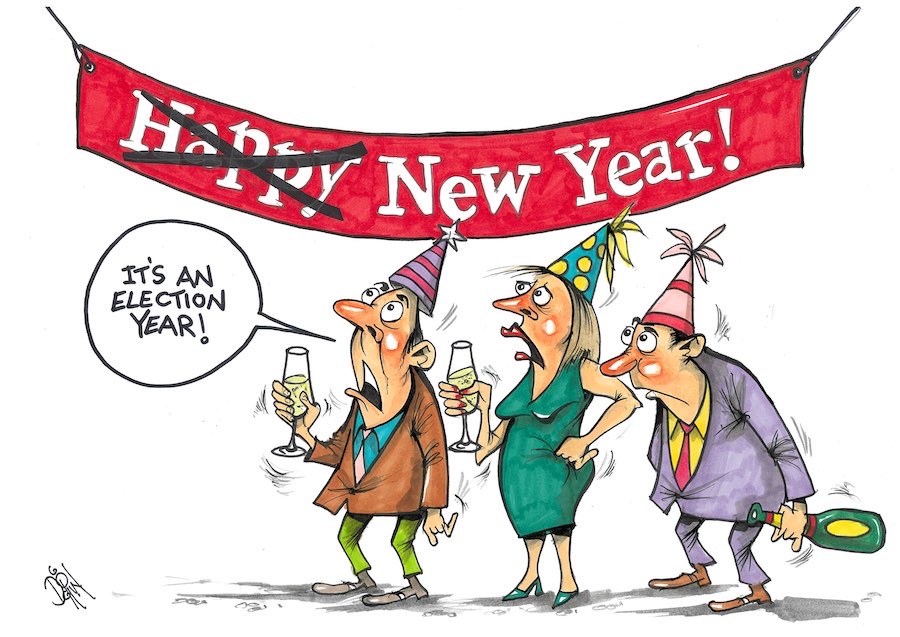“The veil over decisions to prosecute or not to prosecute is unlikely to be lifted unless there’s strong and sustained pressure for our governments to amend the law so that there is a mechanism to force disclosure of the reasons for public prosecutors’ decisions,” says former barrister and “CityNews” legal columnist HUGH SELBY.
FOLLOWING the outing of Victoria Police’s use of criminal defence lawyer Nicola Gobbo, as an informant about her clients, litigation went to the High Court of Australia.

In the case of AB v CD [2018] HCA 58 all seven judges sat, including then Justice Nettle. All seven joined in one judgment. It is a short, powerful decision.
For our purposes the nub is as follows (from paragraph 10 which Is broken up here for ease of understanding):
“Here the situation [with respect to maintaining the anonymity of a police informant] is very different [to the usual instance], if not unique, and it is greatly to be hoped that it will never be repeated.
“[Lawyer Gobbo’s] actions in purporting to act as counsel for the convicted persons while covertly informing against them were fundamental and appalling breaches of [her] obligations as counsel to her clients and of [her] duties to the court.
“Likewise, Victoria Police were guilty of reprehensible conduct in knowingly encouraging [her] to do as she did, and [they] were involved in sanctioning atrocious breaches of the sworn duty of every police officer to discharge all duties imposed on them faithfully and according to law without favour or affection, malice or ill-will.
“As a result, the prosecution of each convicted person was corrupted in a manner which debased fundamental premises of the criminal justice system.
“It follows… that the public interest favouring disclosure (of Ms Gobbo as the informant) is compelling: the maintenance of the integrity of the criminal justice system demands that the information be disclosed and that the propriety of each convicted person’s conviction be re-examined in light of the information. The public interest in preserving [her] anonymity must be subordinated to the integrity of the criminal justice system.”
High Court decisions are rarely short, they are not usually unanimous. That all seven of them were united is telling. The language in this judgment is steely rage.
To appreciate just how strong is the language, think of an occasion when someone whom you respected, who never used a swear word, now spoke in carefully measured phrases, with absolute clarity, the voice just a tad louder than usual, the ice cutting the air, and then they dropped the F word.
The two-part test for prosecuting
That High Court decision is near five years ago and it was passing judgement on actions taken some years earlier by Victoria Police and their informant.
Thereafter, the Victorian government set up a special inquiry. One of its tasks was to recommend whether any criminal charges should be laid against any of the players.
The head of that inquiry was now former Justice Nettle, he who had joined in the forthright AB v CD decision.
As all those who followed the recent public hearings in the ACT’s Sofronoff Inquiry know, the prosecution applies a two-part test to decide whether or not to go to trial. The two parts are: reasonable prospects of a conviction AND the public interest in a trial.
The “public interest” test is most likely to reflect a weighing up of personal factors against community interest factors. “Public interest” figures prominently in the quote from the High Court judgment above.
“Public interest” is far from clean and simple. It’s a term that carries a wide meaning. For example, where an elderly, frail couple decide to assist each other to commit suicide, but one survives, then the survivor could be charged with a criminal offence of assisting a suicide.
Putting to one side personal beliefs about suicide and the taking of life (consider the passionate, competing views about euthanasia) the community interest, arguably, must discourage everyone from self-help to the afterlife.
It is a logical, rational approach for the prosecutor to think and act as follows. In this case, the proof of the elements (the act or acts assisting the death of the other person, together with the intention to do so) of “assist suicide” is straightforward (for example, in a note signed by both people intended for those who found their bodies).
Therefore, the proper approach is for me, as prosecutor for the state, to take the case to court. The criminal justice system can show denunciation of the act and mercy for the survivor in the judge’s sentencing remarks and the sentence imposed. That is the way to show proper appreciation of the public interest.
But that’s not the only logical, rational approach to what is the content of public interest.
It might also be said that the frail survivor of a joint suicide pact is suffering each and every moment. What is to be gained by adding the trauma of going to court, explaining in public the motivations that led to the pact, how it failed, what they feel as the survivor? Surely, such trauma will shorten their life: what irony. Where is the evidence that such a public exhibition will deter any other people, similarly despairing, from taking the same course in the future?
To that can be added, as real public interest factors, whether it is proper to use taxpayers’ funds to prepare and take the case to court, to have 12 jurors available, to incur legal costs for the accused survivor, and, to call experts who have prepared written reports about the physical and mental health of the deceased and the survivor?
In Victoria, the Public Prosecutions Act 1994 requires its Office of the Director of Public Prosecutions to consider each and all of: justice and fairness; the need to conduct prosecutions in an effective, economic and efficient manner; and, appropriate concerns of the victims of crime (section 24).
There may be other reasonable approaches to what is the public interest. What is clear is that reasonable people can, and do, hold incompatible views about the public interest in any specific case.
Transparency and accountability
These competing views need the bright light of public attention. If anyone is charged with making a decision that purports to measure public interest then they should want to make those reasons public to the public that they serve.
That, however, is not the law that applies to decisions to prosecute or not to prosecute by the offices of Directors of Public Prosecutions across Australia. The law drops a veil of secrecy, non-transparency, and non-accountability over ODPP decisions unequalled anywhere else in our legal system.
Readers will be aware that the Albanese government has so far ignored all requests to explain the bases on which Brittany Higgins, an unsuccessful complainant, and one who was given support within her parliamentary workplace, was paid a large sum of taxpayer money.
Such a payment must be grounded in there being viable legal grounds for her claims (ie, the civil equivalent of the criminal reasonable prospects of success) plus the public interest in compensating her.
As with ODPP decisions, in the absence of transparency, there is a natural inclination to suspect at best flawed reasoning, and at worst, corrupted practice.
Corruption here does not mean bribery of any kind. “Corruption” encompasses a skewed thought process, such as putting self-interest ahead of one’s duties. “Corruption” is also used in the quoted passage from AB v CD above.
Thankfully, the veil over the payment to Ms Higgins may be lifted by the new National Anti-Corruption Commission.
But the veil over decisions of ODPP to prosecute or not to prosecute is unlikely to be lifted unless there is strong and sustained pressure for our governments, national and state/territory, to amend the law so that there is a mechanism to force disclosure of the reasons for ODPP decisions.
The reason that the “veil” survives can be found in another High Court decision that repeats well-established principles.
As was said in Ayles v The Queen [2008] HCA 6, by Kiefel J (now the Chief Justice): “The appellant’s contention is that it is no part of the judicial function to determine what charges are to be brought or proceeded with against an accused. This may also be expressed as a judge lacking the relevant power to make such a decision. The contention is clearly correct.
“(Based on some other High Court decisions) it ought now be accepted that certain decisions involved in the prosecution process are insusceptible of judicial review. They include the decision whether to lay or prosecute a particular charge… (an abbreviation of paragraphs 70 and 71).”
To those who have been at the coalface, acting for accused, the wholly unsatisfactory nature of this “non reviewability” has been obvious for yonks.
It is especially obvious when an ODPP loses its way, as happened with the ACT ODPP in its now much-publicised handling of the Higgins allegation.
It is far less obvious when the DPP office holder, and their staff, act with true independence and a mastery of law, procedure and evidence.
The difference of opinion between Commissioner Nettle and the Victorian DPP is not, repeat not, a matter of one being right and the other wrong.
Both may be right, as each has interpreted the test from an informed, independent perspective.
Defence representations
ODPPs invite defence lawyers to submit written argument to them as to why there should be no trial, or that some charges should be replaced with less serious charges, or withdrawn, or the case sent down to a lower court (where the penalties are less). These are known as representations.
Many experienced defence advocates will agree that making representations is counter-productive when the ODPP has an unbalanced approach to its task.
As was reported in the most recent “Weekend Australian” some experienced NSW judges are now criticising the NSW ODPP for bringing sexual assault cases that have no chance of success.
The same has happened while Shane Drumgold SC has been ACT DPP, when a wise judge’s remark to a prosecutor, “Don’t come back” was ignored.
The silver lining
Silver linings can be unexpected. The spat between two formidable Victorian lawyers may benefit the Australian criminal justice system.
The common defence lawyer experience of sexual assault cases being wrongly taken to trial was never newsworthy.
That all the ODPPs were and are unaccountable was also not newsworthy.
Now that it’s the best against the best it is newsworthy.
Perhaps the DPP’s will apply their collective insights to develop a more transparent, and reviewable, mechanism for the difficult cases.
If they don’t or won’t do that then the various attorneys-general could amend the DPP statutes to provide for such a mechanism.
By the way, the DPP statutes may provide for the attorney general to prosecute when a DPP refuses to do so. Alternatively, they do not abolish the right to do so. This happened in Queensland and the case was lost. The DPP had been right – at least as to outcome. This begs the issue as to whether the case had to come to court in the “public interest”.
No doubt the Victorian Attorney General is considering this very issue, but their assessment will be influenced by such other factors as political points, and relationships with Victoria police. This is not to be critical, simply realistic.
Leadership
Readers of my reporting of the Sofronoff Inquiry will recall my admiration for the commissioner and his use of empathy.
I have similar admiration for a previous NSW DPP, Lloyd Babb SC, who travelled far to sit down with a family and explain why there would be no prosecution.
That’s full transparency. That’s leadership.
Hugh Selby’s free podcasts on “Witness Essentials” and “Advocacy in court: preparation and performance” can be heard on the best known podcast sites.
Who can be trusted?
In a world of spin and confusion, there’s never been a more important time to support independent journalism in Canberra.
If you trust our work online and want to enforce the power of independent voices, I invite you to make a small contribution.
Every dollar of support is invested back into our journalism to help keep citynews.com.au strong and free.
Thank you,
Ian Meikle, editor




![Canberra’s woodchopping association – the Hall and District Axemen’s Club – is rebranding to Capital Country Woodchopping.
“We didn’t want to be exclusively a Canberra association and we deliberately left any gender-specific wording out in the new name,” says president Cheyanne Girvan, 32.
“We also went a different [way] to other associations under NSW by not including ‘association’ in our name.”
Four years ago the Hall and District Axemen’s club’s membership was 25.
Cheyanne says this name change will give the club the versatility to grow into other areas and on to greater things.
To read on about Cheyanne's story with the woodchoppers, visit our website at citynews.com.au or click the link in our bio!
@@capitalcountrywoodchopping
#woodchopping #woodchoppinggirl #woodchoppingaustralia #axemen #axewomen #woodcutter #canberrastories #storiesthatmatter #citynews #journalism](https://citynews.com.au/wp-content/plugins/instagram-feed/img/placeholder.png)
Leave a Reply